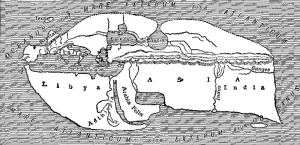Rethinking Late Hellenistic Greek literature and the Second Sophistic

An illustration from the Encyclopaedia Biblica, a 1903 publication which is now in the public domain.
A two day conference, to be held in room S11 in the School of Classics, Swallowgate, Butts Wynd on 5th & 6th September 2013.
The School of Classics’ location may be found at 41 on the Map of University(PDF, 223 KB).
Organisers: Jason König (jpk3@st-andrews.ac.uk) and Nicolas Wiater (nw23@st-andrews.ac.uk)
This conference (generously funded by the BA/Leverhulme Small Research Grants scheme, as the opening event for a two-year project) aims to shed new light on the connections between the Greek literary and intellectual culture of the late Hellenistic and Augustan periods (second century BCE to first century CE) and the period often known as the ‘Second Sophistic’, i.e. the late first to early third centuries CE. The latter period has been a growth area in recent scholarship, but many late Hellenistic authors are still relatively neglected. We ask how far recent approaches developed for the ‘Second Sophistic’ can help to shed new light on late-Hellenistic/Augustan Greek literature and culture. We also aim to explore how far that earlier culture anticipated distinctive literary and cultural developments usually seen as typical of the ‘Second Sophistic’. To what extent do genres and themes we think of as distinctive to imperial Greek literature have their roots in late Hellenistic and Augustan Greek culture? How do these two periods compare in their conceptualisation of Greek culture and its role in the Roman world?
Programme
Thursday 5th September
| 10:30 – 10:50 | Coffee and introduction |
|---|---|
| 10:50 – 11:40 | Jason König: “Strabo’s landscapes” |
| 11:40 – 12:30 | Mario Baumann: “Narrating Periphery: How and to What end Diodorus Describes the Southern Edges of the Oikumene (Bibliotheke 3.15-48)” |
| 12:30 – 14:00 | Lunch |
| 14:00 – 14:50 | Lawrence Kim: “Literary History and Greek Identity in Strabo’s Geography“ |
| 14:50 – 15:40 | Regina Höschele: “The Wondrous Journey of Cicero’s Head to Sardis, or Hellenic Identity and Biculturalism in Greek Imperial Epigram” |
| 15:40 – 16:20 | Coffe break |
| 16:20 – 17:10 | Myrto Hatzimichali: “Stoic Self-Definition and Empire: Strabo on Human and Divine Providence” |
| 17:10 – 18:00 | Emily Kneebone: “Mediating Knowledge in Hellenistic and Imperial Greek literature” |
Friday 6th September
| 09:30 – 10:20 | Joy Connolly: “The Making of Classical Athens in Hellenistic Thought” |
|---|---|
| 10:20 – 11:10 | Matthew Fox: “Dialogic History: Rome from Dionysius to Plutarch” |
| 11:10 – 11:40 | Coffee break |
| 11:40 – 12:30 | Casper de Jonge: “On Imitation: Greek Reading Lists from Dionysius to Dio and Quintilian” |
| 12:30 – 14:00 | Lunch |
| 14:00 – 14:50 | Karen Ni-Mheallaigh: “Late Hellenistic and Imperial Conceptions of Fiction and Fictionality” |
| 14:50 – 15:40 | Peter Bing: “Grand Larcenies: The Poetics of Allusion in the Late Antique Epistolographer Aristainetos” |
| 15:40 – 16:20 | Coffee break |
| 16:20 – 17:10 | Felix Maier: “Narrating the ‘Swarm of Possibilities’ — The Historian’s Challenge of Dealing with Contingency” |
| 17:10 – 18:00 | Nicolas Wiater: “Dealing with Diversity: Redefining the Greek world in Polybius and Chariton” |
Registration
All are welcome to attend.
There is no charge for attendance, but we need to know numbers for catering and seating.
To register, please email classcon@st-andrews.ac.uk by 30th August 2013. Please include:
- Your name and academic affiliation, if any
- Which days you plan to attend
- Any special dietary requirements for lunch, which will be provided.
Please email classcon@st-andrews.ac.uk if you wish to obtain any further information.
Accommodation
The University is unable to provide accommodation for this conference. Bed and breakfast accommodation in the town may be found on the VisitScotland website, but there are several events in the town the week of the conference, so rooms may be difficult to obtain. Early exploration of accommodation options is strongly recommended.
